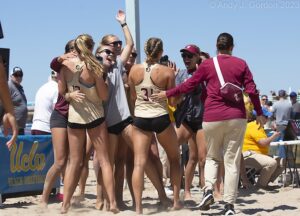
Brooke Niles, FSU beach volleyball, and a tight-knit family bonded by hard things
HERMOSA BEACH, Calif. — Brooke Niles was 34 years old when she was hired as the head coach of the Florida State beach volleyball team. It seemed young to her then and, nine years later, feels even younger to Niles.
“I bamboozled them,” she said on SANDCAST: Beach Volleyball with Tri Bourne and Travis Mewhirter. “Then it was a lot of pressure. We had to get going.”
Which, of course, brought the question: Where do you go? She’d never coached a beach program, other than a club in Long Beach with Matt and Joy Fuerbringer. She’d been an assistant for three years at Santa Barbara after finishing a successful career as an outside hitter for the Gauchos. But to take over a beach program still in its infancy, in the first year the NCAA recognized it as a championship sport, without any family or friends in Tallahassee or any idea, really, how to take over a beach program is a much different ask than to simply coach.
“After they hired me I was like ‘Oh my gosh, what do I do?’ I worked with Scott Davenport when I was playing and I knew how I liked to be coached, but I didn’t really know how this works,” she said. “I drank from a fire hose.”
She’s a fast learner, Niles. Even with a notable dearth in coaching experience, she still finished her first season, in 2016, 32-3, CCSA champs and NCAA runners-up. That summer, she was named the AVCA Coach of the Year.
Now, it’s not as if she took over a moribund program and turned it around overnight. Florida State had already developed a reputation as a perennial contender; its worst season prior to Niles’ arrival was 13-6, in 2015. But Niles didn’t simply accept a decent program and keep everything the same, afraid to fix something that wasn’t really broke. Her style, her competitive nature, her emphasis on strength and conditioning and fitness technology to keep the athletes in peak condition while maintaining health throughout the season, became foundations of the program.
As a professional player, Niles amassed more than $300,000 in prize money. She knew the positive benefits of weight lifting before and, perhaps more important, throughout the season. There was some initial pushback from a number of her players, wondering why they had to lift weights during the middle of spring when they were playing tournaments with multiple matches most weekend, on top of bus rides or flights.
“They weren’t really big on it,” she said. But then, as the season progressed, they could feel themselves getting stronger, not weaker. Niggling aches and pains in shoulders, knees, backs — nuisances to most every volleyball player as a season goes on — weren’t as limiting as they once would have been. They had the strength not only to finish the season as strong as they began, but to finish it on a peak for CCSA and NCAA Championships.
“I’ve always looked at it as, we want to peak the last two weeks. It’s hard to peak for two weeks,” Niles said. “We want to perform well at conference to have momentum going into NCAAs. We train with our lifting and our conditioning and our practices as that’s what we’re working towards. At the beginning of the year, we can still compete with anybody if we’re sore and tired. We want to be healthy, and we use a lot of technology.”
FSU celebrates its win over UCLA/Andy J. Gordon photo
Niles, and Florida State as a whole, has long been an advocate for WHOOP, a wearable on your wrist that tracks heart rate, heart rate variability, sleep, strain, and recovery. When she was playing professionally, living in Santa Barbara, she’d lift at a gym called P3, where Marcus Elliott, the first MLB Director of Sports Science, trains a number of high-profile athletes such as Kevin Durant and Luka Doncic, among others. Even then, in the early 2000s, P3 was on the cutting edge, using force plates and other equipment that measure strain and explosiveness.
“P3 has formed a lot of what we’re trying to do at Florida State,” she said. Force plates are used regularly, and she also has her players wearing devices designed by Kinexon, a German-based sports analytics company which the AVP used on stadium court in 2022. The devices, which strap easily onto board shorts or bikini bottoms, measure load, jumps, and how high a player is jumping, among other metrics. Nothing is full-proof, of course, and injuries are inevitable, but Niles has left no stone unturned when it comes to keeping her players in peak condition.
It’s hard to argue, too, given her success. In eight years at the helm, Niles has never once missed an NCAA Championship. In that span, the Noles have finished runners-up twice, winning an average of 82 percent of their matches. Prior to this season, they had won six straight CCSA championships (there wasn’t a championship in 2020 during COVID).
“We’ve done well. I’m proud of the things we’ve done but it’s super hard every year,” Niles said. “People who look from the outside in think it’s easy, these programs who have done super well, but it’s actually not at all.”
It’s hard, what Niles demands of her athletes, because it’s hard what Niles demands of herself and her program: An NCAA Championship. No East Region team has ever won a national title in beach volleyball. Long Beach State, Pepperdine, UCLA, and USC have long dominated the sport, particularly the latter two. For eight years, Niles has been working at changing that status quo, and she’s nearly been there. To take that extra step, a step no team outside of Southern California has done, she knows it isn’t just a system she’s created that will do it, but to recruit the right athletes who will embrace that system. Florida State isn’t for the faint of heart.
“This is a team we want to be close-knit and like a family. My family just bonded by hard things. My dad would make us race around the block and do sand dunes,” she said. “We do this conditioning test that is a pillar of our program and it’s really hard and they don’t look forward to it but when they accomplish it they feel like they’ve done something they didn’t think they could do. It adds mental toughness. From the inside-out, we just want to be a family that works hard. It’s not for everybody, but I think it’s been successful and it gives these young women confidence going in and trying to play professional.”
It’s the gritty ones who make the cut, the players like Alaina Chacon and Molly McBain, undersized dynamos who once played together on court one and are now winning AVP Tour Series events and playing at the highest level on the Beach Pro Tour, respectively. It’s players like Brook Bauer and Katie Horton and Maddie Anderson and Macy Jerger, all of whom are now enjoying success as professionals, embracing the low-paying grind of the AVP with a sandy smile, that are the secret sauce of the Florida State program — players who see a hard task and gravitate towards it rather than side-step around it.
“FSU has these unbelievable athletes who are trying to be professional. So you have this slow pace, small town feel, and then you get into this university and you get into the weight room and you’re like ‘Oh my gosh, that guy is going to be in the NFL, that guy is going to the NBA, this woman was just in the Olympics.’ It’s just crazy,” Niles said. “It motivates me to be better.”
There is but one box Niles and Florida State have left to check: a national championship. She’s hired the best assistant to help the Noles get there, too: Nick Lucena, her two-time Olympian husband who has quickly developed a knack for coaching.
“He’s such a good coach. When I hired him, everyone was like ‘Ah, you hired your husband.’ And I said ‘No, I hired the best coach.’ He really is,” Niles said. “His resume speaks for itself and he has a way of connecting with athletes. He’s a great teacher. And he’s never done it, this is his first year coaching, really, it’s all natural. It’s really cool.
“We haven’t won yet,” she continued, “and that’s a sticking point that a lot of people talk about that every championship has been from the West Coast but I just feel like we’re doing a lot of good things and it’s bound to happen. It’s all I think about, it’s all Nick thinks about, but it’s not what we define ourselves by.”
How they define themselves is a bit more ambiguous than the objective measurement of a championship or not. They’re just a family who works hard, bonded by sand dunes and weights and conditioning tests that might just make you puke. That’s good enough for them.
Soon enough, it’ll be good enough for an NCAA Championship, too.
Brooke Niles celebrating with her athletes at Florida State/Florida State photo
The post Brooke Niles, FSU beach volleyball, and a tight-knit family bonded by hard things appeared first on Volleyballmag.com.
Read More Volleyballmag.com NCAA Beach


